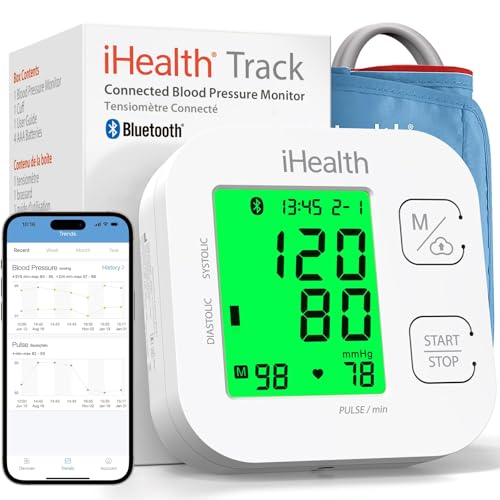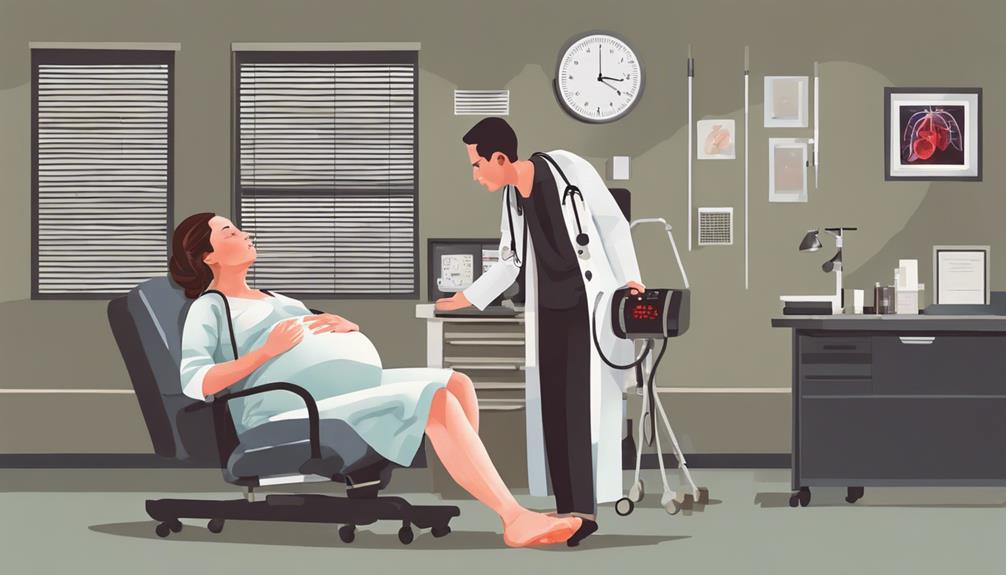In our role as healthcare providers, we often encounter the issue of managing hypotension or low blood pressure (BP) in pregnant individuals, particularly in the third trimester when it can affect around 10-20% of expectant women.
This condition poses unique considerations and risks that require careful attention. By exploring effective management strategies and understanding the implications of low BP on maternal and fetal health, we can navigate this complex aspect of prenatal care with precision and expertise.
Let’s investigate further into the nuances of managing low BP in pregnancy’s critical final trimester.
Key Takeaways
- Stay hydrated and eat small, frequent meals to manage low blood pressure effectively.
- Use compression stockings to support blood circulation and reduce symptoms like dizziness.
- Practice relaxation techniques to alleviate stress and anxiety, contributing to blood pressure stability.
- Regularly monitor blood pressure levels to track changes and address any concerns promptly.

CHARMKING Compression Socks for Women & Men Circulation (3 Pairs) 15-20 mmHg is Best Athletic for Running, Flight Travel, Support, Cycling, Pregnant – Boost Performance, Durability (S/M, Multi 03)
COMPRESSION SOCKS – We intend combining fashion, technology and science to bring you the triple comfort without. The…
As an affiliate, we earn on qualifying purchases.
As an affiliate, we earn on qualifying purchases.
Causes of Low Blood Pressure
Low blood pressure in the third trimester of pregnancy can be attributed to various factors, including hormonal changes, expanded blood vessels, dehydration, anemia, stress, and conditions like preeclampsia.

During pregnancy, our bodies undergo significant hormonal fluctuations, causing blood vessels to relax and expand, leading to a drop in blood pressure. Dehydration, often exacerbated by the increased demands on the body during pregnancy, can further lower blood pressure levels. Anemia, a common condition in pregnant individuals, reduces the blood’s ability to carry oxygen, contributing to low blood pressure.
The stress and anxiety that can accompany pregnancy also play a role in lowering blood pressure. Additionally, conditions like preeclampsia, characterized by high blood pressure, can paradoxically result in low blood pressure in late pregnancy.
Understanding these causes is crucial for managing low blood pressure in the third trimester, ensuring a healthy pregnancy for both the mother and the baby.

iHealth Track Smart Upper Arm Blood Pressure Monitor with Wide Range Cuff That fits Standard to Large Adult Arms, Bluetooth Compatible for iOS & Android Devices
Clinically Accurate: Easy Operation by two buttons, Advanced Accuracy, No Calibration required.
As an affiliate, we earn on qualifying purchases.
As an affiliate, we earn on qualifying purchases.
Symptoms of Low Blood Pressure

When experiencing low blood pressure symptoms in the third trimester of pregnancy, it’s essential to pay attention to signals such as dizziness, lightheadedness, and feelings of faintness. These symptoms can be alarming, but knowing what to look for is critical for taking appropriate action. Here are some common symptoms to watch out for:
- Fatigue: Feeling unusually tired even after getting enough rest.
- Confusion: Difficulty concentrating or processing information clearly.
- Nausea: Persistent feelings of queasiness or an upset stomach.
- Blurred Vision, Shallow Breathing, Cold, Clammy Skin: These signs can indicate decreased blood flow and shouldn’t be ignored.
If you notice any of these symptoms, it’s important to inform your healthcare provider promptly. While these signs can be concerning, seeking medical advice can aid in managing low blood pressure effectively and ensuring the well-being of both you and your baby.

Boobie Hydromom Superfood Electrolyte Drink Mix, Watermelon Yuzu | Refreshing Energy & Hydration Boost for Mamas | On-The-Go & Travel Essentials for Pregnancy, Lactation, & Beyond, 15 Packets
Say Hello to Hydration: Get hydrated and stay energized with the refreshing flavor of our Watermelon Yuzu Hydromom…
As an affiliate, we earn on qualifying purchases.
As an affiliate, we earn on qualifying purchases.
Risks Associated With Low BP
As pregnancy progresses into the third trimester, the potential risks associated with decreased blood pressure become increasingly significant, impacting both maternal and fetal health. Low blood pressure in this stage can lead to reduced blood flow to the placenta, potentially affecting fetal growth and development. Risks include an increased likelihood of preterm birth and developmental delays in the baby.
Mothers may also experience dizziness and lightheadedness, putting them at a higher risk of falls and injuries. Monitoring low blood pressure in the third trimester is essential to prevent complications for both the mother and the baby.
Severe low blood pressure during this period can have a profound impact on the overall health and well-being of both the mother and the developing baby.

Pink Stork Postpartum Essentials Kit – Hormone Balance, Recovery & Mood Support for New Moms – Postnatal Vitamins Ashwagandha + Herbal Teas for Stress Relief, Energy, Sleep – Gift Set – Vegan, Organic
Support your fourth trimester with our comprehensive Postpartum Essentials Kit — designed for new moms navigating hormonal shifts,…
As an affiliate, we earn on qualifying purchases.
As an affiliate, we earn on qualifying purchases.
Management Strategies for Low BP

To effectively manage decreased blood pressure during pregnancy’s third trimester, implementing specific strategies can greatly improve maternal and fetal well-being. Here are some key management strategies for low blood pressure:
- Stay Hydrated: Drinking plenty of water throughout the day helps maintain blood volume, preventing dehydration and supporting healthy blood pressure levels.
- Consume Small, Frequent Meals: Eating nutrient-rich foods like fruits, vegetables, whole grains, and lean proteins in small, frequent meals can help stabilize energy levels and blood pressure.
- Use Compression Stockings: Healthcare professionals may recommend compression stockings or garments to improve circulation, reducing the risk of low blood pressure episodes.
- Practice Relaxation Techniques: Incorporating relaxation techniques such as deep breathing, prenatal yoga, or meditation can help manage stress, promoting overall well-being and positively impacting blood pressure levels.
When to Seek Medical Help
If you experience severe symptoms like chest pain, shortness of breath, or vision changes during the third trimester of pregnancy, seeking immediate medical help is essential for ensuring both maternal and fetal well-being. It’s important to contact your healthcare provider if you notice a sudden drop in blood pressure readings or have a history of low blood pressure that worsens in the third trimester.
Prolonged feelings of dizziness, fainting, or extreme fatigue should prompt a call to your healthcare provider for further evaluation.
Any concerning symptoms related to low blood pressure in the third trimester should be reported to your doctor promptly. Being vigilant and proactive about your health during this critical time is crucial for the well-being of both you and your baby. Your doctor can provide the necessary guidance and support to address these symptoms effectively.
Frequently Asked Questions
When Should I Go to the ER for Low Blood Pressure During Pregnancy?
If experiencing severe symptoms like chest pain, vision changes, or persistent low blood pressure during pregnancy, seek immediate medical care. Worsening dizziness, fainting, or alarming signs warrant emergency attention. It’s important to address any concerning symptoms promptly for best maternal and fetal health.

How Much Low BP Is OK in Pregnancy?
Feeling a bit like a vessel steering through tranquil waters, a moderate drop in blood pressure during pregnancy, around 90/60 mmHg, is generally okay. However, any severe or persistent symptoms should prompt a chat with the doctor.
What Blood Pressure Is Concerning in Third Trimester?
In the third trimester, blood pressure below 90/60 mmHg can be concerning. Monitoring regularly is key to safeguarding both mom and baby’s health. Persistent low blood pressure may require medical intervention for managing potential complications.
How Can I Raise My Low Blood Pressure Immediately in an Emergency?
If facing low blood pressure in an emergency, lie on your left side, elevate legs, drink fluids, eat salty snacks, avoid sudden movements, and take deep breaths for quick relief. These steps can help stabilize blood pressure levels effectively.
Conclusion
To sum up, managing low BP in pregnancy during the third trimester requires a delicate balance of hydration, nutrition, and caution. Remember, fainting isn’t a fashion statement – it’s a sign to sit down!
So, stay hydrated, move slowly, and seek help if needed. And always remember, the only falls we want during pregnancy are the leaves outside, not ourselves.
Stay safe and take care of yourself, mama!









